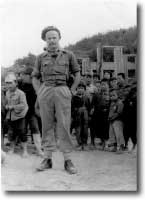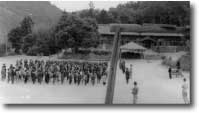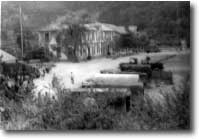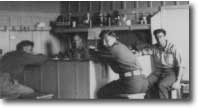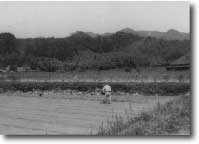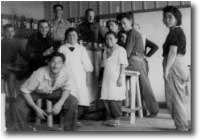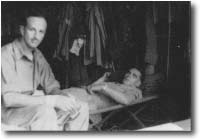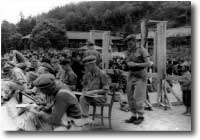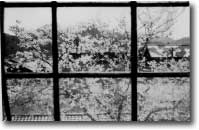|
| ||

|
Memories of JapanIn Yamaguchi with 25 Batteryby WL Ruffell |

|
PREPARING FOR THE MAIN PARTYAfter several hours in a train the condition and speed of which was reminiscent of the New Zealand variety, we arrived in Yamaguchi in the late afternoon. At the station we were met by a U.S. Marine NCO who invited us to their camp where the Marines had laid on a hot meal for us. It was a very good meal indeed, and we found our hosts excellent types. The barracks allotted to the units to be stationed at Yamaguchi had been wrecked by Japanese vandals. Windows had been smashed, doors and walls kicked in, light fittings removed, wiring torn out etc etc. My assistant, Gunner Tom Cole, and I had the unenviable task of making the place habitable before the rest of the Battery arrived. But the cream of the joke was that we were to pay the local civilians to repair the damage they had done! Labourers were to receive the equivalent in yen of three shillings sterling a day, and tradesmen six.
Fortunately, in the 25 Bty barrack block a store-room full of American rations had been well-secured and having no windows its contents were intact. Although 'run-of-the-mill' according to American standards, almost every item was to us a luxury. There was canned chicken, canned turkey, orange juice, tomato juice etc etc, as well as a quantity of fresh potatoes - probably of New Zealand origin - which we had not seen since we had left "Godzone'. For the two or three weeks these rations lasted we lived like lords! Among the rations were several dozen cakes of chewing tobacco called 'Old Mule'. As none of us chewed tobacco we tried to smoke it but it would not burn. We then tried to 'hock' it to the Japanese but found they knew all about it; obviously the "Yanks" had also tried to 'hock' it! Old Mule proved a dead loss. Also more or less intact were two workshops, one containing wood-working machinery, the other engineering equipment. As an independent battery we had our own LAD for whom the latter proved most useful. To return to the job in hand, each Advance Party NCO had to assess the nature and amount of work to be done in his particular barrack block, gauge the number of tradesmen/labourers he could handle, then demand them on a daily basis from the local civilian authority. The latter then allocated the bodies on a morning 'Parade' held for the purpose.
This 'parade' never ceased to intrigue me. The local headman would put out his markers exactly according to 'Drill All Arms', order "Labourers on No 1, carpenters on No 2 etc etc - Get on Parade." Immediately the assembled horde of down-at-heel civilians would come to attention, march smartly on to their markers, pick up their dressing, and stand properly at ease in as orderly a manner as on an Army Schools parade! Obviously they had all undergone military training. The headman would then detail the lucky ones who would fall out and report to their respective Advance Party NCOS. Those who had missed out he would then dismiss. In an early allocation of labourers I had an unexpected stroke of luck; among the squad was a student whose aim in life was to become a member of the Diplomatic Corps, but whose family was unable to pay for his university training. He was therefore obliged to work for a term to raise enough money to pay for his next term at university. His name was Tadagori Teranishi (we called him 'Ted' for short), and as he already spoke quite good English his assistance in translating my instructions to the workers proved invaluable. Not only was he a very willing worker, he always looked on the bright side of things. In addition he materially assisted me with my Japanese vocabulary. I hope he achieved his ambition. Generally speaking the tradesmen worked well, but some of the labourers proved 'awkward,' and had to be 'encouraged' by Tom who carried a one-inch thick bamboo stick for the purpose. If a Jap gave trouble I would say, "Tom, bamboo stick," whereupon Tom would deliver two or three sharp swipes across the awkward one's backside while I covered him with my pistol in case of trouble. Of course such treatment was highly illegal, but I was not prepared to stand any nonsense. Especially awkward were two or three Japanese who had signed up for kamikaze units but had been frustrated by the war coming to an end before they could fulfill their obligations to the Emperor, i.e. donate their lives. Usually they performed only once; Tom's bamboo stick greatly discouraged encores! If any reader takes exception to our actions let him or her remember the thousands of prisoners-of-war the Japanese Army starved and worked to death - or murdered - in their POW camps. The Yamaguchi camp was infested with rats some of which were 'almost as big as rabbits'. For a time we had great fun taking pot-shots through the barrack windows at these animals which frequented an open drain alongside the building. But spoil-sport neighbours complained to the authorities about the ricochets, so we were advised - not ordered - to desist,because if we killed someone, even a Jap, 'things might get awkward!'
Rat-shooting was good fun; we missed it, as there was little to amuse us in Yamaguchi. Few shops displayed any stock; those shopkeepers with any goods of value had hidden them in the country, fearing wholesale looting by our troops. Eventually, after they found we were not quite as bad as their Government had painted us, they began to produce things. Japanese propaganda had indeed 'painted' us. When a few of us took our first stroll from the barracks into the city all the 'mums' screamed at their kids playing in the street to come inside - and slammed the doors behind them! When I asked Ted the reason for this peculiar behaviour he said the Japanese Government had told the population that all New Zealanders were black, that we were all cannibals, and that we particularly liked small children! The locals soon woke up; when they found we were not all black, nor did we knock any of their kids on the head and cook them, they became quite friendly. Fraternisation with the population was forbidden early in the occupation by BCOF Headquarters, but the rule was soon relaxed. It would have been impossible to police, and no one took any notice of it anyway. YAMAGUCHI BREWERYA brewery was operating in Yamaguchi, and beer was available. It was quite palatable but like that obtained in Italy was very weak owing to the general shortage of sugar. In the evenings we would sit down to a dozen bottles each, and by 2000 hrs would be getting quite talkative. To obtain supplies the powers-that-be ordained that each unit have an authorised 'beer Officer', but as we rarely saw an Officer, let alone one per unit, subterfuge became necessary: For 25 Battery I typed a letter authorising myself as 'beer Officer,' signed it with a fictitious signature, and presented it at the brewery. There it was accepted without question!
The beer was not very expensive, but strange to say the crates cost quite a bit more than their contents, so, having two regular carpenters on my 'staff,' a workshop, plus a good supply of timber, I put the tradesmen to work (in their spare time, of course) making crates. These Tom and I 'traded' in at the brewery. But as Robbie Burns once said about the affairs of mice and men that 'gang aft agley' all good things come to an end. One day while at the brewery we watched the old Jap 'bottle-o' filling crates with empty bottles. He had one of our 'ring-in' crates but could get only 23 bottles into it (in Jap crates the bottles stood upright, not on their sides as in the current New Zealand variety). After considering the problem for some minutes and muttering to himself, the old bloke woke up. He departed for the office with the ring-in - and that was the end of our little game. Still there were no repercussions, and we did pretty well while it lasted. We suspected one of the carpenters deliberately made the crate undersized but hesitated to tax them with their 'crime'.They were too useful in other respects.
THE THINGS YOU FIND IN THE ODDEST PLACESIn another of our operations (a legitimate one), we struck trouble with Jap labourers. The latrines for our barrack block were of the 'deep hole variety,' i.e. each consisted of a shed with a row of built-in seats located over a trench. When the latter filled up a new trench was dug, the shed shifted over it, and the old trench filled in. On this occasion we had reached the stage when the squad was about to fill in the old trench, when I happened to glance down at the contents. There to my loudly-expressed annoyance were two of my shovels which had 'disappeared' plus a number of other useful articles, including a Jap rifle and a sword. So I ordered the squad to descend into the excreta and rescue the gear lying therein. The reaction was not unexpected. There followed much hissing, muttering, and loud complaints that to do so would cause them to 'lose face', which they could not possibly do. But rescue the articles they did, with the aid of our pistol-bamboo stick drill. I then ordered them to wash everything in disinfectant. If looks could have killed..... The sword was rather a good one, and after obtaining a certificate from the BC that I had obtained it honestly I brought it back to New Zealand where it later fetched a very good price. The rifle, too, was rather special. It was a Model 99 (1939) 7.7-mm arm introduced to replace the Model 38 (1905) 6.5-mm Arisaka as the basic infantry weapon, but with the outbreak of war did not go into full production. I toyed with the idea of bringing it back to New Zealand where it would have proved a useful collector's piece, but feared the possibility of being caught with it by Customs. As it turned out I need not have feared, for Customs were quite uninterested in what was in our kitbags. AND THEN THERE WERE THE AMERICANSOnce we had settled in we took steps to return the hospitality of our friends in the U.S. Marine Corps who had welcomed us on our arrival, by throwing a party. Imagine our surprise when they turned up with a bus-load of screaming women, mostly of easy virtue. To our queries they replied,"Guess we thought you guys might like a bit of arse!" Needless to say a good time was had by all.
The Marines informed us that they were about to depart for the United States, that they would be leaving quite a bit of equipment behind, and if we wanted any of it then we should be on hand before they went. We were. In fact their OC was rather hurt that we began loading gear into our vehicle before the Marines actually moved out. "You guys might have waited until we'd gone," he said. But we knew others had the same idea we had, and in those days 'you had to be quick' as the saying went. WHY I DON'T EAT RICEBCOF Headquarters had warned us not to buy or eat fruit or vegetables from the local markets, firstly because food for the locals was in very short supply, and secondly because any produce probably contained dangerous bacteria, through the use of untreated sewage as fertiliser. We were soon made amply aware of the latter practice. Near the barracks was a small paddy field, i.e. a field of mud, in which a farmer grew rice. To prepare the field the Jap first stirred up the mud with a harrow-like implement pulled by a bullock, he himself following behind 'up to his hocks' in the stuff. The stench produced was indescribable, why we were soon to discover.
After planting (the rice plants were planted out singly in rows) by the farmer and his family, came fertilisation. One day there arrived at the paddy a 'honey-cart,' soldier slang for the Japanese version of the New Zealand 'night-cart' used to collect the contents of privies before the advent of flush toilets. The Jap then lined up Mum and the kids each of whom carried a bucket into which he and the honey-cart operator placed a quantity of untreated human excreta mixed with water. They then ladled a portion of the mixture on to each individual rice plant. This performance put me off rice for years! BEWARE THE PERILS OF DRINKBCOF also warned us not to drink Japanese spirits, especially whisky, as cases of poisoning had occurred. The poisoners' technique was to drill a hole in the bottom of the bottle, insert the poison, then plug the hole - a nasty trap for the unwary.
Thus when offered drinks by any Jap with whom we did 'business' we always ensured he filled his glass from the same bottle - and drank first. The Japs were not offended by our apparent discourtesy; they knew the story.
VISIT TO HIROSHIMADuring the month we spent refurbishing the barracks some of the NC0s, including myself, found time to visit Hiroshima which is in Honshu, not far from Yamaguchi.We wished to see the effects of the first atomic bomb dropped there the previous August. To my knowledge the authorities had issued no warnings of the danger of radioactivity, nor did we see any warning notices near the city, but the Japanese must have got the message for we saw none of them either. As there was little to see we did not stay long - which later led us to hope we had escaped any deleterious effects of the radiation. Seeing a whole city flattened and burnt out by a single bomb certainly impressed us with the power of nuclear weapons - and this was only a little one, of a mere 20KT. A few shells of the more solid concrete buildings were all that remained standing. On the ground were ashes, pulverised brick and concrete, and dust, with here and there a blob of glass which had melted in the heat. We did not say much as we drove back to barracks.
HAND-OVERAfter about a month the main party of J-Force arrived from Italy. 25 Battery occupied the barracks which by now we had made quite habitable. The BC was quite satisfied with the job Tom and I had done and everyone was happy - more or less. But all good things come to an end. Being a Number One, i.e. Sergeant in charge of a gun, I was ordered to relinquish my 'command' of the civilian workers and again take over my detachment. A small party of maintenance workers, stewards etc was retained but handed over to a W02 who was 'spare,' i.e. surplus to establishment. I expected some such rearrangement of duties but disappointment came when the local headman threw a party for the NCOs i/c civilian labour, an invitation to which was sent to the W02, but not to me.
Later, that worthy took perverse pleasure in describing to me in great detail the highlights of the party which by rights I should have attended. Chief among the highlights was his performance with the 'bint' handed over to him for the night - and whose services were free!
THE INTERNATIONAL CLUBIn any discourse on service experiences the subject of 'amore' inevitably arises. When the advance party arrived in Yamaguchi a brothel known as the "International Club' was operating on the outskirts of the city. It was a clean, well-run establishment and strictly controlled by the U.S. Military Police, who in due course handed it over to our MPs. To visit this 'house of ill-fame' as the do-gooders described it, involved quite a long walk, there being little or no transport, public or otherwise, available. Nevertheless, the soldiers preferred this inconvenience rather than picking up enthusiastic but-often unclean amateurs off the street because they knew the brothel inmates were free from disease. The rare case of VD among the latter was promptly barred from 'practising,' and had her name and complaint prominently displayed for the benefit of clients. Girls could be hired for varying lengths of time, or could be taken 'home' for the night by special arrangement with 'Mama-san' (the Madam), in which case they had to be back at the Club by 0800 hrs the following morning. Cavorting with naked girls in hot baths - and at the same time drinking beer - was also a popular pastime. The few - the very few - who wished to remain 'pure' just got drunk! Then came the main body of the Occupation Force - and with it sundry 'pillars of the church,' i.e. the Chaplains. We now witnessed a remarkable ecumenical exercise in which those who 'dug with the left foot' combined with those who 'dug with the right' in an unholy alliance, the sole purpose of which was to close the International Club. Completely ignoring correct Army channels of communication these misguided parsons wrote directly to the Minister of Defence in New Zealand requesting that he order the Club closed. That honourable gentleman - who had been a 'boot-clicker' before being elevated to ministerial status - granted their request. This he did without doing the decent thing and referring it to the Brigade Commander! The next 'act' in this shocking performance took place in an Officers' Mess where the Brigadier gave the offending 'gentlemen' the father of all tongue-lashings - in the presence of the other Officers. I have it on good authority (from one of the Officers there present) that he called them all the names imaginable, firstly for going 'over his head,' and secondly for the increase in VD their action would cause. Deprived of a clean and properly organised brothel, the troops sought the services of street-girls whose standards of hygiene were questionable at the best of times. In due course customers at the 'ostrich farm' rapidly multiplied - as the Brigadier had prophesied.
OCTUNot long after the Main Body had settled in an Officer Cadet Training Unit (OCTU) was formed at Yamaguchi. As the OC was a Gunner Officer he called upon 25 Battery for NCO instructors in drill and physical training (PT). I was selected to take drill, while another RF Sergeant was to take PT. The OC instructed us to make things as tough as possible for the Officer Cadets, his object being to ensure they could all 'take it'. As products of Army Schools pre-World War 2 I can assure the reader we were both well-capable of 'dishing it out' - and we did so.
Part of the Cadets' course programme included a two-day exercise officially designated a patrol in a back-country area. In reality it was a forced march of some 40 miles over rough, dusty, metalled or dirt roads, or through scrub-covered areas, the prime object being again to test the Cadets' ability to 'take it'. The Cadets were armed with rifle and bayonet and carried full pack, while we carried only small pack and pistol. We each controlled half the squad with orders to set the pace at 130 paces a minute over the whole 'course'. As well as testing their physical fitness the exercise was designed to try their patience. For example, late in the evening of the first day we arrived at a school in which the OC said they could bed down for the night. Then after everyone got comfortable he announce a change of plan - and all 'hit the road' again. This caused some muttering but nothing more at this stage. Now the OC had told the Cadets that on the afternoon of the second day as we returned to Yamaguchi he would lay on a truck to pick them up on the outskirts as he did not want them to march through the city in their dusty and dishevelled condition. But at the RV he arrived in his jeep with a further 'change of plan': the truck had broken down, and they would have to march - at attention - right through the city back to barracks. At this moment he found the man for whom he had been looking: An 'Old Dig' - a Warrant Officer in his unit - sat down on the side of the road saying,"You can shove your commission up your bloody arse, I'm staying here until you lay on the truck you promised". Needless to say he was returned to unit next day.
HOCKINGAs with 'amore' no account of experience in the service can be complete without a discourse on 'hocking' - the soldier's attempt to augment the pay allotted him by a parsimonious government. The first article of 'trade' which comes to mind is whisky. In addition to adequate supplies of good Scotch, e.g. White Horse, for which we paid 8/6 (85c) a bottle, we began to receive Australian, mostly Corio, at 5/- (50c). No member of the mess drank Corio - besides being cheap it was decidedly nasty. Instead we hocked it to the Americans. The highest price obtained.-for a single bottle was $US60 - believe it or not! The average American soldier apparently could not differentiate between good and bad whisky. He gauged its quality by how quickly it could put him 'out the monk!' To digress a moment we also received a supply of Australian beer, but having no refrigeration in the mess when a bottle was opened during the hot weather a third of the contents ended up on the ceiling! It was deemed a 'dead loss'. The Japanese being very clean in their personal habits, and soap being in very short supply, the crafty Kiwi soon capitalised on the situation. Letters home to Mum emphasised the shortage, without of course mentioning that it applied to civilians only. Quantities of soap soon appeared in parcels to 'needy' soldiers who promptly sold it to Japs at pretty well any price they liked to name. Sugar was also very scarce, as already mentioned in the beer story. It fetched a pound a pound, i.e. one pound sterling for a pound weight (454 grams). The price in New Zealand at that time was no more than a few pence for the same quantity. A certain Warrant Officer, knowing that I 'knew my way around,' informed me that he had a quantity of sugar 'surplus to requirements' which he wished to hock. Being too scared to do the job himself he asked me if I would do it for a half-share in the proceeds. I agreed. First I obtained a bag which held about 20 lbs, and which I could dangle between my legs under my greatcoat and so be unnoticed at night when leaving the camp through the main gate. Here were posted a sentry plus a Japanese policeman. The former was not concerned with what soldier brought into barracks or took out, nor was the latter. However, under the circumstances it did not pay to advertise. Getting rid of the sugar proved a lengthy business but was well worth the effort.
Incidentally the policeman appeared anxious above all to pay the correct compliments to anybody with rank - even Sergeants! He would salute, bow, and raise his hat - all in the same movement! On another occasion two of us were 'doing a trade' with one of the local shopkeepers when suddenly came a scream of brakes - plus a scream of 'police' from his wife. On looking out the door we could just see the front of a jeep with the bumpers painted white - the style favoured by the MPs. Out the back of the shop we went at high speed, thence clearing a number of fences in a way any obstacle course man would have applauded. Our goods we left behind. Next day we revisited the shopkeeper who bowed and profusely apologised for his wife's mistake, after which we successfully concluded our deal, as our goods were still intact. It transpired the jeep belonged to the Engineers! We always did 'business' with regular dealers, never with any Jap not personally known to us. The reason was that that the U.S. S.I.B. (Security Intelligence Bureau) employed American-born Japanese (Nisei) as plain-clothes agents whose specially was the trapping of people doing a bit of hocking. I don't recall any Kiwi being caught. During our tour of duty in Japan the authorities made an attempt to curb black market activities by changing the currency without warning. Overnight Japanese yen ceased to be legal tender, occupation currrency being substituted. Persons holding Japanese yen were permitted to exchange a limited amount only. A few of our Sergeants were caught with large amounts of yen much of which had accrued from gambling. Poker and other 'schools' operated in the quarters, and large sums of money changed hands. Fortunately for those 'caught' most of it was loot money. The 'lurk' - as the saying went - was to 'live' on loot money, so leaving the pay-book intact. Fortunately I myself did not get 'caught'. With portion of my loot money I bought a high-quality camera (German) which still works very well after over 40 years. With the rest I 'lived'.
A couple of incidents during 25 Battery's stay in Yamaguchi may be of interest: A number of younger fry who had arrived in Italy with the last reinforcements and had seen no action suddenly decided to refuse to fall in and march to mess, as had become the custom. After all the easygoing ways of the Division were no longer acceptable in the Occupation Force. They were duly 'matted' and sentenced by the BC to an hour's pack drill each day for a week. Our reputation for inflicting 'punishment' on Officer Cadets no doubt having been duly noted, my colleague and I from the OCTU training days were selected to see the BC's sentence carried out. We therefore had each miscreant fill his pack with 45 lbs (20 kg) of rocks - checked by weighing - which he carried in addition to rifle and other equipment. We then subjected the squad to a full hour's foot-drill at 130 paces to the minute with no breaks. Needless to say much mutinous muttering ensued. Many were the dire threats which trickled back to us through the 'grapevine,' including one of being thrown overboard on the way back to New Zealandl But the 'cure' worked; there were no more refusals to march to mess. The BQMS also had a spot of trouble. His cooks became 'bolshie'. They would not do this or they would not do that. So he 'sacked' them, i.e. ordered them out of the cookhouse and down to the gun park to do maintenance on the equipment with the rest of the Gunners - and stopped their extra duty pay. When the cooks demanded to know in a jeeringly sarcastic manner who would do the cooking, the BQMS said he and his assistant. This the two proceeded to do quite successfully, and after a few days the cooks returned 'with their tails between their legs' offering to do as they were told if the BQMS would give them back their old jobs. He did so and had no further trouble. In those days of course we had no Catering Corps. Cooks in an Artillery unit were artillerymen. One further incident in which a fellow Sergeant and I 'sailed rather close to the wind' may be of interest. The Sergeants Mess was very well supplied with spirits. Knowing this, a friend from my old unit ("C" Troop 6 Field Regiment) asked me to get him a bottle of whisky as he and a cobber wished to celebrate their respective birthdays which fell close together. Now as he and I had been in action together, and as it was an unwritten law in the Regiment that Sergeants shared their whisky issue with members of their detachments, how could I refuse? Conditions in BCOF were, of course, different; regulations expressly forbade the supply of spirits to junior ranks. I therefore charged him on no account to reveal his source of supply. Unbeknown to me his cobber had successfully approached another Sergeant with a similar request. Thus the two celebrated not with a single bottle but a bottle each! The outcome was the appearance of the pair before the BC charged with drunkenness, creating a disturbance, as well as damaging sundry pieces of furniture and barrack equipment. During the 'inquisition' the BC tried his damnedest to find out where they had obtained the whisky. Fortunately for the other Sergeant and myself the two proved to be good soldiers in at least one respect - they kept their mouths shut!
HEAT OF A DIFFERENT KINDBy June 1946 the weather in Japan had become very hot and very wet. For a month I recall it rained every day. We wore little more than shorts; any more made life extremely uncomfortable.
About this time the authorities offered us three days' leave in Tokyo which normally would have been snapped up. The catch was our khaki drill (KD) uniforms were all worn out and scruffy with no replacements in sight, so the same authorities ordained we wear battle-dress, boots, and anklets. With temperatures over 30�C many of us therefore turned the leave down.
HOMEWARD BOUNDAt last came the welcome news that we were to return to New Zealand. The BC now suggested that as many of us had been 'burning the candle at both ends' and had done other things we ought not to have done, it behoved us to return home in good health. To this end he had arranged that all those who so wished could have a blood test. Those desiring the test were to parade under the BSM and march to the hospital for the purpose on a certain day. In the event the whole-battery paraded! At the hospital the looks we suffered from the nursing staff closely resembled those from the Japs I had ordered to remove gear from the latrine! We duly embarked on the Chitral for an uneventful trip which lasted about a fortnight. The South Islanders we dropped at Lyttelton, the Northeners at Wellington. Neither my Sergeant friend of the pack drill episode nor myself were thrown overboard! All the real 'baddies' were locked up in the ships 'brig' situated at the 'sharp end,' i.e. right in the bows. During the voyage I was in charge of the guard on these characters for 24 hours - armed with a rifle and 50 rounds. The ship's crew took perverse pleasure in reminding us that there were still mines left over from the war about - and if the ship struck one both guards and prisoners would be 'kaput'. The prisoners had all been sentenced in Japan for various offences chief of which were armed robbery, rape and murder. The maximum sentence in each case, to be completed in New Zealand, did not exceed two years. And so we said "Sayonara Nippon".
COMMENTARYWhen calling to mind my experiences in both Italy and Japan - two countries 'on their knees' after World War 2 - I cannot help thinking of pacifists and other peculiar people who object to money being spent on defence. Apparently the possibility of New Zealand getting into a similar state, one effect of which left thousands of wives selling their bodies so their children might eat, does not worry them at all. This did in fact occur in both countries. Husbands, i.e. those still living, could do nothing as so many of them were still in POW camps months after the war ended. Even when the husbands were released they had no jobs. Economies were wrecked, the black market ruled, and money hardly worth the paper upon which it was printed. Nor it seems are pacifists concerned that the enemy might round up their sisters and daughters for incarceration in establishments designed for the 'comfort' of their troops - as did the Japanese Army in territory it occupied. WL Ruffell Tales from the Trails index | Home
| ||
